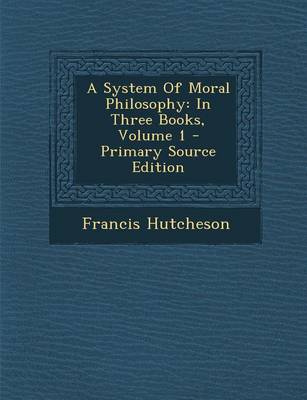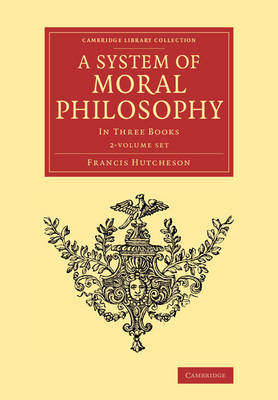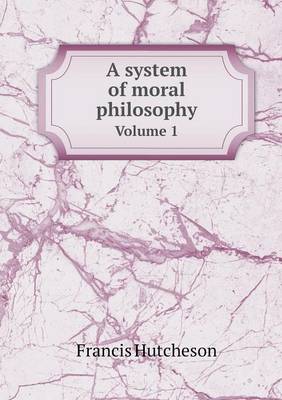Cambridge Library Collection - Philosophy
2 primary works • 4 total works
Volume 1
Francis Hutcheson (1694-1746) was a key figure in the Scottish Enlightenment and one of the 18th century's most influential philosophers. He taught Adam Smith, helping shape his widely influential economic and moral theories, and he greatly influenced Hume and Bentham. His theory that the only proper actions are those which will generally benefit society prepared the way for the English utilitarians. His views were extensively discussed throughout Britain and ranged as far as the American colonies, where his political theory was read and adopted by revolutionaries. He is best known for his contribution to moral theory, being the chief exponent of the "moral sense" doctrine which, following Shaftesbury, emphasized feeling rather than reasoning as the source of judgements of virtue and vice. "A System of Moral Philosophy" was written as early as 1738, but added to and altered by Hutcheson throughout his life. Published posthumously in 1755 by Hutcheson's son, Francis the younger, the "System" is Hutcheson's longest work and the fullest explanation of his method.
Giving a comprehensive account of morality in three books, it includes discussions of human nature; our duties to God, to each other and ourselves; the supreme good; civil liberty; rights; contracts; marriage; the rights and duties of parents; and the laws of peace and war. The work also contains an argument against slavery that was reprinted in colonial Philadelphia and helped give academic weight to the anti-slavery movement. William Leechman, a friend of Hutcheson and Professor of Divinity at Glasgow, contributes to a biography.
Giving a comprehensive account of morality in three books, it includes discussions of human nature; our duties to God, to each other and ourselves; the supreme good; civil liberty; rights; contracts; marriage; the rights and duties of parents; and the laws of peace and war. The work also contains an argument against slavery that was reprinted in colonial Philadelphia and helped give academic weight to the anti-slavery movement. William Leechman, a friend of Hutcheson and Professor of Divinity at Glasgow, contributes to a biography.
Volume 2
Often described as the father of the Scottish Enlightenment, Francis Hutcheson (1694-1746) was born in the north of Ireland to an Ulster-Scottish Presbyterian family. Organised into three 'books' that were divided between two volumes, A System of Moral Philosophy was his most comprehensive work. It synthesised ideas that he had formulated as a minister and as the Chair of Moral Philosophy at the University of Glasgow (1729-46). Published posthumously by his son in 1755, prefaced by an account of his life, it is the only treatise by Hutcheson for which a manuscript is known to have survived. Asserting that individual natural rights derive from an innate understanding of moral behaviour, Hutcheson offers a model that mediates between individual interests and communal ideals. Containing the concluding chapters of Book 2 and Book 3, Volume 2 explores the role of familial and political governance in relation to communal happiness.
Often described as the father of the Scottish Enlightenment, Francis Hutcheson (1694-1746) was born in the north of Ireland to an Ulster-Scottish Presbyterian family. Organised into three 'books' that were divided between two volumes, A System of Moral Philosophy was his most comprehensive work. It synthesised ideas that he had formulated as a minister and as the Chair of Moral Philosophy at the University of Glasgow (1729-46). Published posthumously by his son in 1755, prefaced by an account of his life, it is the only treatise by Hutcheson for which a manuscript is known to have survived. Asserting that individual natural rights derive from an innate understanding of moral behaviour, Hutcheson offers a model that mediates between individual interests and communal ideals. Volume 1 describes the role and perception of 'perfect' and 'imperfect' natural rights. Volume 2 explores the role of familial and political governance in relation to communal happiness.
Often described as the father of the Scottish Enlightenment, Francis Hutcheson (1694-1746) was born in the north of Ireland to an Ulster-Scottish Presbyterian family. Organised into three 'books' that were divided between two volumes, A System of Moral Philosophy was his most comprehensive work. It synthesised ideas that he had formulated as a minister and as the Chair of Moral Philosophy at the University of Glasgow (1729-46). Published posthumously by his son in 1755, prefaced by an account of his life, it is the only treatise by Hutcheson for which a manuscript is known to have survived. Asserting that individual natural rights derive from an innate understanding of moral behaviour, Hutcheson offers a model that mediates between individual interests and communal ideals. Containing Book 1 and part of Book 2, Volume 1 describes the role and perception of 'perfect' and 'imperfect' natural rights.



